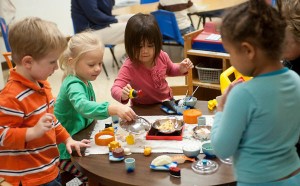 To fully prepare to work in the education of children from the ages of birth through five years, the opportunity to specialize a Master’s in Education in Early Childhood Education is often a preferred step. With a foundation in various areas of teaching young children and helping in the development of skills for learning, social interaction, and emotional well-being.
To fully prepare to work in the education of children from the ages of birth through five years, the opportunity to specialize a Master’s in Education in Early Childhood Education is often a preferred step. With a foundation in various areas of teaching young children and helping in the development of skills for learning, social interaction, and emotional well-being.
The Role of the Early Childhood Educator
The early childhood educator has many opportunities for making a difference in the lives of children from birth to middle childhood. Early childhood educators might hold positions with intervention groups working with disadvantaged children from infancy through toddler age, pre-school programs for children with high risk indicators for learning barriers, kindergarten classrooms, or school district curriculum development teams.
The start of gaining the knowledge and skill to work in early childhood education at the graduate degree level begins with the early childhood master’s curriculum. Including courses in foundations in early childhood education, inclusive education, classroom management, learning and development of children, infant and toddler development, health and safety of young children, and studies in family dynamics. Additional information on the skills needed for early childhood education professionals can be reviewed at the National Association for the Education of Young Children website.
Within the early childhood education major in a graduate degree program, there are options for further specialization. These concentrations in a specific area are beneficial when beginning or advancing in a career in the field.
Language and Literacy
The literacy studies concentration focuses on helping to develop skills in both writing and reading, and this particular area also often includes course work specifically for teaching in a classroom setting. Some common courses include emergent literacy and language development, reading problems in young childhood, phonics, children’s literature, educational technology, and linguistic diversity in the classroom.
A similar concentration is the English as a Second Language (ESL) option. Much of the course work in this specialization is similar to that in the literacy studies focus, but it also often includes literacy and new ESL learners, language development and ESL, reflective practice in teaching new language learners, family and culture, and cognition and language.
Diverse Learners Concentration
Like literacy studies and ESL in the early childhood setting, the diverse learner concentration is often focused on preparing teachers for the classroom. Additional courses that are often a part of this program include family engagement, assessment of diverse learners, working with families of special needs children, language and literacy development in diverse learning groups, and research and theories in diverse learning education.
Administration and Program Design
A number of concentrations also prepare graduates to step into leadership or other types of roles outside of a classroom. These options include curriculum and instruction as well as leadership and supervision. Courses might include staff development, parental education, assessment and observation, program design, public policy in education, and administration in early childhood education.
Related Resource: Educational Technology
Whatever position an early childhood educator has decided to pursue, the right education will help to prepare teachers or administrators to meet the unique needs of children in early childhood programs. With options to specialize a Master’s in Education in Early Childhood Education, educators will be ready to make an impact on the future.
Be the first to comment